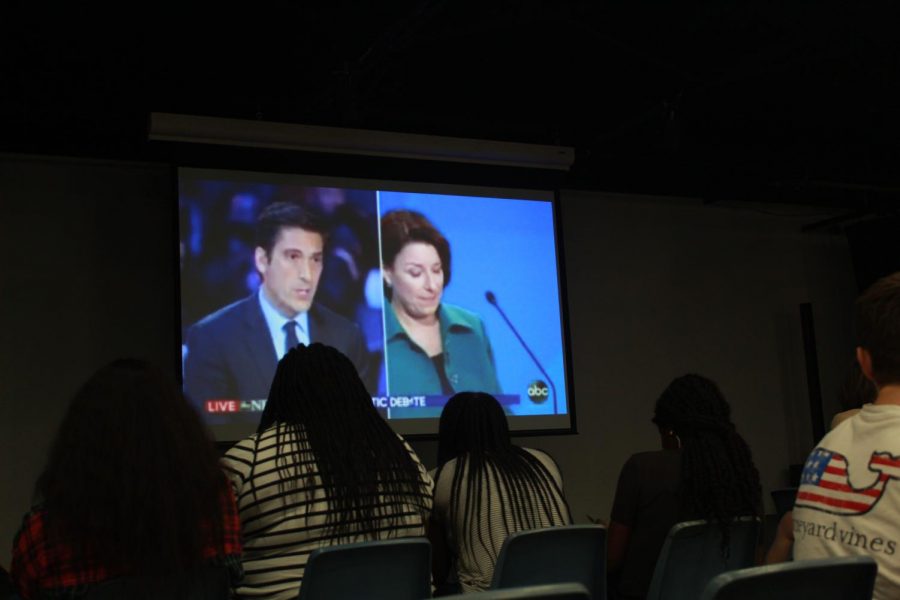Thoughts after the Democratic debate
Students herd into Shackleford Auditorium to watch the Third Democratic Debate.
September 19, 2019
This past Thursday, the Third Democratic Debate was held at Texas Southern University in Houston, Texas. With the candidates throwing shade and the hosts struggling to evenly distribute screen time, it was a pretty standard debate.
Healthcare dominated the conversation, though gun violence and immigration were also major topics. Each candidate made their case against President Trump, the most notable being Kamala Harris’ analogy:
“The bottom line is this: Donald Trump, in office on trade policy, you know, he reminds me of that guy in ‘The Wizard of Oz,’ you know, when you pull back that curtain, it’s a really small dude?”
Julian Castro and Joe Biden held the debate’s required shouting match, during which Castro brought attention to Biden’s supposed degrading memory. On the topic of healthcare, Castro disagreed with the portion of Biden’s plan which would require citizens to buy into it. Biden countered arguing he had not said anything about buying in, to which Castro responded:
“Are you forgetting what you said two minutes ago? Are you forgetting already what you said just two minutes ago? I mean, I can’t believe that you said two minutes ago that they had to buy in and now you’re saying they don’t have to buy in. You’re forgetting that.”
Really, a tasteful quarrel.
As each of the ten candidates made their proposals and tried to sway the country in their favor, the question arose of who could actually win. Could one of these candidates actually replace our current president in office? What sort of person could accumulate the favor of the country and hold their own against the slander of the opposing party?
The answer may not lie within the extremities seen on stage. In fact, it’s more likely that none of these candidates will be able to win. As terrible as he is, both as a president and as an individual, Trump has high approval ratings among Republicans. It’s already a difficult task to defeat a president who’s been in for one term, but the man also has a tight-knit following. He has a way with an audience, and he’s made many voters love him. Add to that the disorganization of Democrats and many liberal-minded citizens who don’t vote, and the unfortunate possibility of Trump sitting for two terms gets higher. So, when it comes to choosing a Democratic candidate for the 2020 election, the party should unite under the desire to see a sane person in the White House rather than argue over the intricacies of policy. Forget for a moment the names and faces actually running and consider a hypothetical candidate.
A common belief among liberals seems to be that an equally extreme candidate from the left would have the best chance. Surely a Democratic candidate who can be heard above the rest, shouting their opinions loudly enough to stay in the camera frame can stand up to the president. Bold Tweets posted at the crack of dawn would gain the world’s attention for their wildly progressive stances. Promises for big changes, not necessarily paired with solid plans for how those changes would be made and other bouts of blind idealism will sway those stuck between parties. A “fight fire with fire” strategy.
Or perhaps it should be up to a candidate whose very existence is so radical, on account of being a woman, black or, gay, that outspoken behavior is unnecessary. These defining features speak for the candidate’s personality anyway. And since it’s known that the most important detail to consider when choosing the country’s next president is whether or not they eat meat or animal products, as in Cory Booker’s case, those who vote left may decide a raging vegan will win the election. So long as he agrees not to enforce his dietary choices on the rest of the country, he may even sway those of neutral alignment.
Honestly, it would be fantastic if a Democratic candidate could simultaneously take office and break another one of those silly “firsts” that hinder the nation from progressing society’s perception of equality; however, there is a good chance that an oppositely extreme force won’t be able to stand their ground. Rather, a more neutral candidate may be the best option.
In such a divided political climate, many voters find themselves stuck between two extremes, forced to choose one when neither represents their beliefs or interests. It might be that a candidate with a more neutral political alignment will gain the support of the majority of the country as well as the ability to take the Oval Office. Otherwise, those neutral voters will somehow find a way to justify a surplus of appalling behaviors in order to feel as though their more conservative political/economic beliefs are represented.
The most difficult obstacle to get past will probably be President Trump’s impressive ability to make such a mockery of an opponent that they can no longer be seen as anything but the label so kindly bestowed upon them. Consider: “Crooked Hillary” Clinton, “Lyin’ Ted” Cruz, “Little Marco” Rubio, “Crazy Bernie” Sanders, etc. These deceivingly simple nicknames catch on quickly, spread among the general population, and heavily alter how these individuals are seen by the public eye.
The effectiveness of these nicknames decreases when the target has no characteristics worth mocking. For example, Biden is an old, straight, white man who has already held a high government position and whose biggest crime, as far as the president is concerned, is being associated with Obama. There’s nothing spectacular about him, and that gives him a huge advantage because “Boring Joe” won’t be strongly negative enough to stick around.
Of course, this is not to say Biden is the one who will bring the country out of the “presidential scandal a day” lifestyle, but it’s important to consider the possibility that the voice of reason might not be such an “extreme” one. If the nation felt comfortable voting in a president who ran on the platform of demonizing refugees and immigrants while siding with renowned white supremacists just three years ago, there’s no reason to think the same people will vote so differently now.
Editor’s note: The author of this piece asked for their name to be removed due to safety issues following their graduation.









